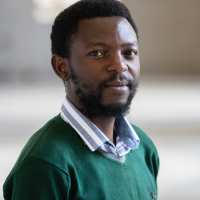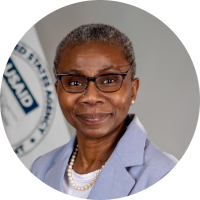Africa-China Relations: Causes of Tension and Possible Peace Pathways—A Case Study of Zambia
On October 16, 2019 the Wilson Center Africa Program hosted the event “Africa-China Relations: Causes of Tension and Possible Peace Pathways—A Case Study of Zambia.” Dr. Monde Muyangwa, Director of the Africa Program moderated the event. The event featured Dr. Emmanuel Matambo, current Southern Voices Network for Peacebuilding Scholar at the Wilson Center, and Postdoctoral Fellow at the University of KwaZulu-Natal in South Africa; Dr. Yoon Jung Park, Associate Director of the China Africa Research Initiative at Johns Hopkins University; and, Dr. Patrick W. Quirk, Senior Director of the Center for Global Impact at the International Republican Institute. This event explored Africa-China relations at the state and non-state levels, with a focus on sub-national relations in Zambia.
Dr. Park began by framing the discussion around some of the trends and shifts in Chinese migration to Africa. While noting that Chinese migration to Africa goes back to the 1800s, she explained that there has been a rise in the levels and composition of migration. With some estimates as high as 1.6 million Chinese migrants to the continent, she noted the inclusion of more women, children, and contract workers. As the number of migrants has risen, there have been some tension points between Chinese migrants and African citizens. She highlighted five key areas where tensions have arisen: jobs, labor practices, language and culture, perceived competition, and crime. Regarding jobs, Dr. Park pointed out that while complaints originally focused on Chinese workers crowding-out opportunities for African workers, this has changed and research now indicates that Chinese firms are creating more jobs than are being taken up. In some countries such as the Democratic Republic of the Congo and Angola, however, some Chinese employers claim that local companies do not have the necessary skills in order to complete some of the infrastructure projects so they continue to hire Chinese workers. Another change she noted was that of Chinese migrants moving into the labor sectors traditionally only occupied by Africans, such as retail. She emphasized that just as Africa is not monolithic nor is China, and that most migrants are independent of Beijing and are in Africa to seek a better life for their families. In addition to changing demographics in these African countries, Chinese identity is also changing as the formation of a pan-Chinese identity is beginning to take shape in places such as South Africa and others as migrants begin to put down roots and develop affinities for their host countries.
Dr. Matambo offered a perspective on the evolving relationship between China and Zambia. The relationship between China and Zambia is long-standing, beginning a mere five days after Zambia’s independence in 1964, and strengthened by China’s support for the crucial TAZARA railway. Initially, the relationship was state-to-state but has evolved to include the sub-national dimension. He argued that tension between Chinese migrants Zambians stems from questions of identity. Under the predominant state-to-state model, Zambians mostly perceived Chinese identity as constructed by the state. However, as the number of Chinese migrants and associated non-state activities have increased, Zambians are increasingly constructing an identity of the Chinese through their personal interactions with ordinary Chinese. And, while there is a semblance of cordiality in relations at the state level, this is not necessarily the case at the subnational level. Dr. Matambo cited disputes over labor practices and increasingly heated political rhetoric directed against Chinese—sometimes blaming them for issues such as youth unemployment—as examples of these rising tensions. Dr. Matambo proposed several recommendations to address the tensions between Zambians and Chinese. On the issue of land use, he noted that the Zambian government should do more to ensure that Chinese migrants follow the official process and are in compliance with the Land Act, rather than relying on unofficial negotiations. He supported confining Chinese investors to economic engagement at the industrial level, rather than sectors that displace Zambians. He also suggested barring the Chinese-driven gambling industry, whose social impact has become a real issue of concern. He recommended broadening the mandate of Confucius Institutes to be two-way institutions that involve reciprocal language and cultural exchange, rather than the current situation where Zambians learn Chinese language and culture without the reverse taking place. In closing, Dr. Matambo asserted that the Chinese state’s policy of non-interference should be revised as it is respected in theory and not in practice and will continue to damage China’s image with the population.
Dr. Quirk spoke to Africa and China relations from an international view, specifically from a U.S. policy perspective. He observed that U.S. policy views China’s growing influence in Africa through the lens of great power competition. Noting a report by the International Republican Institute on China’s influence on democracy globally, he highlighted areas of concern including China’s opaque trade deals and the ballooning debt of African states due to infrastructure loans, pointing out the threat this could pose to U.S. interests in Africa. Two primary initiatives by the U.S. include expanding economic relationships via Prosper Africa and encouraging African leaders toward sustainable and transparent deals. Dr. Quirk proposed several options to enhance U.S. engagement, including coupling the U.S. focus on economic engagement with democracy assistance, realizing that the strength of democracy is a key determinant of economic competition. Dr. Quirk suggested the need for U.S. funded trainings to strengthen local journalism to serve as a watchdog, and citizen diplomacy exchange programs to build civil society capacity. He concluded that foreign aid programs are necessary to strengthening civil society and keeping a check on corruption by holding leaders accountable.
The SVNP is a continent-wide network of African policy, research and academic organizations that works with the Wilson Center’s Africa Program to bring African knowledge and perspectives to U.S., African, and international policy on peacebuilding in Africa. Established in 2011 and supported by the generous financial support of the Carnegie Corporation of New York, the project provides avenues for African researchers and practitioners to engage with, inform, and exchange analyses and perspectives with U.S., African, and international policymakers in order to develop the most appropriate, cohesive, and inclusive policy frameworks and approaches to achieving sustainable peace in Africa.
This event was livetweeted and webcast. Follow the Africa Program Twitter account @AfricaUpClose and catch up on the conversation #ChinaInAfrica
Speakers

Research Director, Centre for Africa-China Studies, University of Johannesburg
Introduction

Moderator

Hosted By

Africa Program
The Africa Program works to address the most critical issues facing Africa and US-Africa relations, build mutually beneficial US-Africa relations, and enhance knowledge and understanding about Africa in the United States. The Program achieves its mission through in-depth research and analyses, public discussion, working groups, and briefings that bring together policymakers, practitioners, and subject matter experts to analyze and offer practical options for tackling key challenges in Africa and in US-Africa relations. Read more
